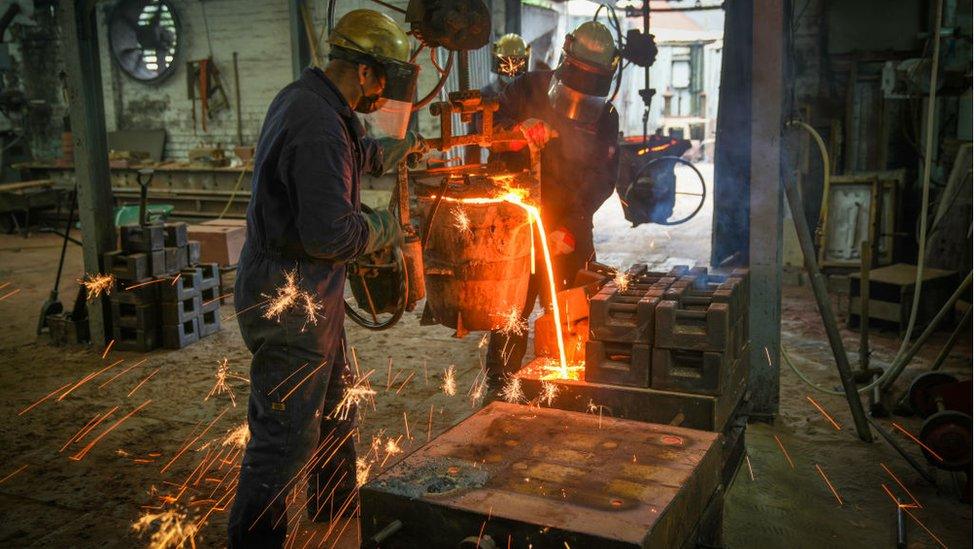Bank of England vows to bring down inflation
- Published
- comments

The Bank of England has hinted at further interest rate rises as it vows to bring inflation back down to 2%.
The central bank's focus was getting prices down and making life more affordable again, its chief economist Huw Pill said in a speech on Wednesday.
In May, UK inflation hit 9.1%, its highest level in 40 years. And interest rates are at a 13-year record high of 1.25%.
Mr Pill said he was open to voting for an interest rate rise above 0.25%.
This is the same figure the Bank of England decided on for the last five interest rate increases in a row.
'The new normal'
Mr Pill said his statement showed he was willing to adopt a faster pace of tightening but also emphasised that it was dependent on what the economic data showed.
He stressed that "much remains to be resolved before we vote on our August policy decision".
"How I vote on that occasion will be determined by the data that we see and my interpretation of it," he said.
Sir Jon Cunliffe, a deputy governor at the bank, told BBC Radio 4's Today programme it would act "forcefully" to make sure higher inflation does not become "the new normal".
Inflation is the increase in the price of something over time. For example, if a bottle of milk costs £1 one year and £1.09 the next year, then that's an annual inflation rate of 9%.
The UK's rate of inflation is being driven up as the prices of fuel, energy and food soar in part due to the war in Ukraine and sanctions on Russia.
In June, the Bank of England warned inflation could reach 11%
One way to try to control rising prices - or inflation - is to raise interest rates. This increases the cost of borrowing and encourages people to borrow less and spend less. Higher interest rates also motivate people to save more.


The Bank of England chief economist's warning of "difficult times for many people" is meant to reiterate the commitment the Bank has to get inflation down in the coming months.
Huw Pill's speech seems to back up forecasts in the City that the Bank will raise interest rates by half a percentage point at its meeting next month.
While we have heard repeatedly that the Bank and the government seek to avoid the emergence of a self-fulfilling spiral of rising prices and wages, perhaps the most interesting part of the speech concerned companies.
He suggested firms were re-establishing profit margins through higher pricing after supply chain disruptions.
He also pointed to worker shortages from both the pandemic and Brexit. These domestic factors could multiply the energy price rises leading to high persistent inflation.
The Bank's job was already difficult, but changes in the UK economy, and further falls in sterling, are now complicating it further. Faster rate rises are on the cards.

Analysts at Capital Economics have predicted that the Bank will ultimately have to lift rates to 3% to quash inflation.
But other economists think they won't have to go so high. Pantheon Macroeconomics reckon interest rates will peak at 1.75%.
Some manufacturers' groups have also urged the Bank of England to show some restraint on raising interest rates due to the importance of "low-cost borrowing".
'Difficult times'
Mr Pill told a central banking conference hosted by King's Business School he wanted to speak more "directly" and "bluntly" about tackling inflation.
"Returning inflation to its 2% target is at the heart of the MPC's actions over the past 10 months," he said.
The MPC stands for monetary policy committee - a group of nine members within the central bank that try to guide the economy with measures such as raising or lowering interest rates.
Mr Pill said households were facing "difficult times".
"We recognise the hardship associated with elevated inflation rates," he said, noting that lower income families were being forced to spend more on energy and food due to higher prices.
"Recent price rises have imposed a significant squeeze on their real incomes," he said.
In June, the central bank raised interest rates from 1% to 1.25%, the fifth consecutive rise.
Suggesting that further rate hikes were on their way, Mr Pill said: "Acting to achieve the 2% inflation target is now more important than ever. In the MPC, we have both the tools we need and the resolve it will take."
Deputy governor Sir Jon told Radio 4's Today programme: "It's our job to make sure that as this inflationary shock passes through the economy we don't find that leaves us with inflation being the new normal, the sort of embedded psychology."
Related topics
- Published5 July 2022

- Published16 June 2022

